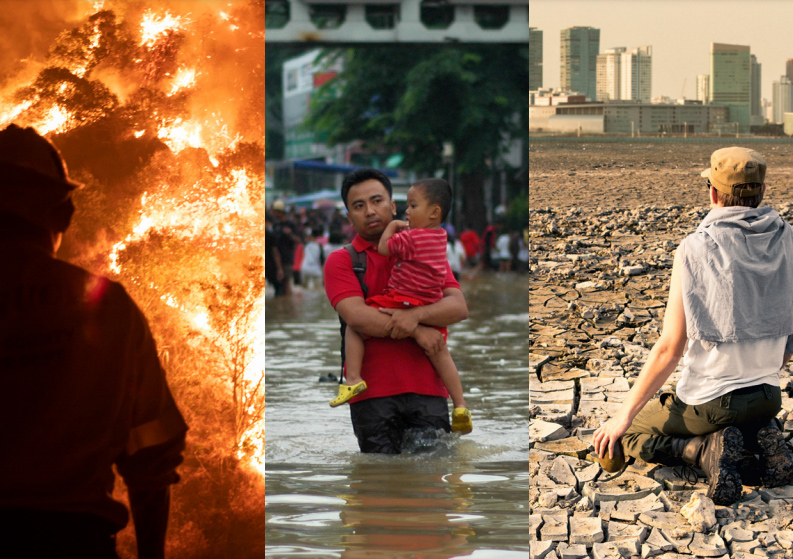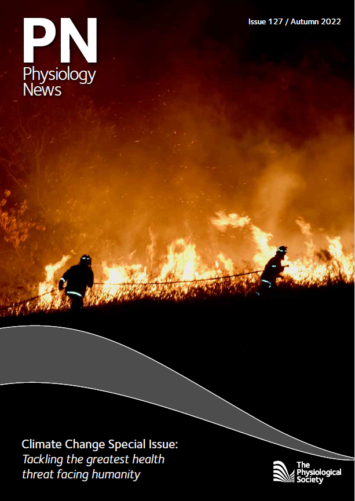
Physiology News Magazine
Policy Focus
How can our understanding of physiology help us mitigate and adapt to climate change?
News and Views
Policy Focus
How can our understanding of physiology help us mitigate and adapt to climate change?
News and Views

https://doi.org/10.36866/pn.127.9
Shania Pande
Policy Officer, The Physiological Society
In this article, Shania Pande, the Society’s newest Policy Officer, explores the importance of physiological research in the response to climate change and sets the key priorities for public policy.
Climate change is the world’s biggest threat to health, according to the WHO (World Health Organization, 2021). Over five million deaths in a year are due to the direct impact of climate change such as heat, extreme weather, air pollution, and food insecurity. Together, these extreme weather events not only pose an immediate risk to life but also affect health and physical work capacity. The impact of climate change extends to beyond human health, as extreme weather can cause biodiversity loss and result in the collapse of ecosystems.
Physiology is central to the scientific response to climate change as it helps us understand the impact of a changing environment on health, diet and productivity. Further, physiology plays an important role in mitigating climate change by reducing greenhouse gas emissions and in adapting human and animal physiology to ensure the health of the planet as a whole. Thus, it is essential to understand the key areas where physiology can contribute to the development of responses to tackle climate change.
Recognising this, The Physiological Society brought together physiologists from across the world, along with organisations such as the Intergovernmental Panel on Climate Change (IPCC), Wellcome, and Lancet Countdown on Health and Climate Change to understand the key physiological research gaps relating to the mitigation and adaptation to our changing environment and set priorities for public policy. The resulting pamphlet The Climate Emergency: Research Gaps and Policy Priorities was published in July 2022.

Key research gaps
Physiological research is key to the development of responses to climate change, yet there remains a paucity of evidence in this area. Research gaps include using thermal physiology to help humans feel comfortable at (or in) warmer temperatures without relying on air-conditioning mechanisms, developing sustainable diets that meet nutritional requirements, and encouraging active travel. There is also a need to focus on vulnerable populations such as older people, pregnant people, those with co-morbidities and people with a low socio-economic status to minimise the impact of extreme weather events on people that are most severely affected.
The multifaceted impact of climate change requires interdisciplinary collaboration between physiologists and other research areas such as sustainable urban development and public health to develop responses to counter its effects. These could include greening cities with trees, community parks, and rooftop gardens to keep us cooler amid rising temperatures.
Priorities for public policy
The policy response to climate change requires an interdisciplinary approach. Physiology by nature is an interdisciplinary science; it provides the interface between physical and life sciences and therefore forms an important part of the solutions. Government strategies should harness physiological research when developing public health guidelines to address climate change. Some priorities for the UK Government to consider include developing policies and safe working practices for different extreme environments, introducing effective early warning systems ahead of extreme weather events and developing sustainable proteins and alternative diets that meet the required nutritional standards. Further, the Government should work with other nations to develop local strategies and ensure that the gap between high-, middle- and low-income countries is not widened by policies to address climate change.
Given the importance of physiology in mitigating and adapting to climate change, The Physiological Society will continue to work with other climate-focused organisations to push national governments to prioritise human health and ensure it is at the forefront of agreements resulting from COP27.
The Physiological Society’s report “The Climate Emergency: Research Gaps and Policy Priorities” and further information about our policy work surrounding climate change can be found at: www.physoc.org/climatechange
References
World Health Organization (2021). Climate change and health. Online. Available at: https://www.who.int/news-room/fact-sheets/detail/climate-change-and-health
